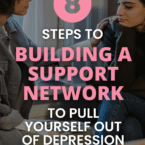
When you’re battling depression, it can often feel like you’re utterly alone. But remember, you don’t have to face this challenge in isolation. Building a robust support network can be a significant part of your journey to pull yourself out of depression.
Having people to lean on can provide emotional assistance, a different perspective, and even practical help when you’re going through a tough time. In this article, we’ll guide you through eight steps to build a support network that can help you navigate your path out of depression.
The Value of a Support Network
While professional help is crucial in managing depression, a personal support network also plays a significant role. A good support network can provide comfort, reduce feelings of isolation, offer practical help, and even improve your coping skills.
Remember, it’s okay to ask for help, and it’s okay to lean on others. Let’s explore the steps you can take to build your support network.
8 Steps to Building Your Support Network
1. Recognize the Importance of a Support Network
The first step is to understand that it’s okay to need others. We’re social beings by nature, and having others to lean on can make the journey out of depression more bearable.
2. Identify Potential Supporters
Make a list of people in your life who could be part of your support network. These might be family members, friends, co-workers, or even members of a club or group you’re part of.
3. Reach Out
Opening up about your struggles can be challenging, but it’s a crucial step in building your support network. Choose someone from your list and let them know what you’re going through. You might be surprised at how willing people are to help.
Related: 7 Ways Physical Activity Can Lift You Out of Depression >>
4. Join Support Groups
Whether online or in-person, support groups can be incredibly helpful. They provide an opportunity to connect with people who understand what you’re going through because they’ve been there themselves.

5. Make Connections through Hobbies or Interests
Engaging in activities you enjoy can help you connect with others and build your support network. Whether it’s a book club, a hiking group, or a local art class, shared interests can provide a basis for meaningful relationships.
6. Engage with Professionals
Professionals, like therapists or counselors, are an important part of your support network. They can provide you with the tools and strategies to manage your depression effectively.
7. Consider a Support Pet
Pets offer unconditional love and companionship. Studies have shown that they can help reduce symptoms of depression and anxiety. If it’s feasible for you, consider adding a furry friend to your support network.
8. Stay Connected
Once you’ve built your support network, make an effort to stay connected. Regular check-ins can help you maintain your relationships and ensure you have someone to turn to when times get tough.
Related: 9 Nutritious Foods That Can Help You Dig Out of Depression >>
Final Thoughts
Building a support network when you’re dealing with depression might seem daunting. But remember, you don’t have to do it all at once. Start with small steps, and remember, it’s okay to ask for help. You’re not alone, and with a strong support network, you’ll have people to lean on as you pull yourself out of depression.
Resources
If you’re feeling suicidal or need immediate help, please reach out to a trusted professional or contact a crisis line like the National Suicide Prevention Lifeline at 1-800-273-TALK (1-800-273-8255) or use the Crisis Text Line by texting HOME to 741741.
For resources on support groups, consider websites like the Depression and Bipolar Support Alliance or Mental Health America. For depression and mental health resources, the National Institute of Mental Health or the American Psychological Association can be useful.
















